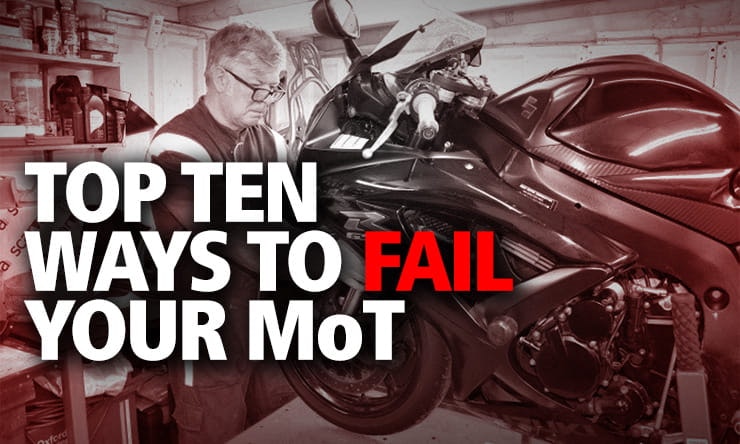Top ten ways fail your motorcycle MoT
By John Milbank
Consumer Editor of Bennetts BikeSocial
27.09.2019
Is your motorcycle due an MoT? If it is, check the headlights, as data from the Driver and Vehicle Standards Agency shows that almost 10% of bikes – 88,103 – failed their MoTs due to faulty lights or reflectors.
The data, which covers the first full year of the new MoT (20 May 2018 – 19 May 2019) also shows that just over 4% (40,277) of motorcycles failed the test due to brake defects…
Top ten motorcycle MoT failures…
The new MoT brought in minor, major and dangerous defect categories in a bid to help riders better understand what was wrong with their vehicle. ‘Dangerous’ and ‘major’ defects automatically lead to a failure, and the DVSA advises that vehicles with a ‘dangerous’ defect should not be driven until repaired. You can read more about the MoT, and hear what a tester has to say about it, by clicking here.
There were 951,741 initial motorcycle MoTs taken between 20 May 2018 and 19 May 2019 – of these, 48,883 had ‘dangerous’ defects, so were taken off the road or repaired. There were 161,852 initial failures (17% of all tests).
“DVSA’s priority is helping everyone keep their vehicle safe,” said Neil Barlow, DVSA’s Head of Vehicle Engineering. “The new MoT has seen nearly 50,000 dangerous motorcycles either repaired or taken off the road. But it is concerning that such a high proportion of defects are to do with lighting and brakes, both of which have a major impact on the rider’s safety.
“With just over 5.1% of motorcycles failing their MOT for being dangerous we urge people to sign up to our free MoT reminder service so they get their MoTs done on time, helping keep Britain’s roads safe.”
28% of all vehicles turn up late for an MoT, so the DVSA scheme makes sense, reminding owners by SMS or email four weeks and two weeks before their vehicle’s test is due. You can also check the date of when a vehicle’s MoT is due, view its MoT history and download a free copy of the latest MoT certificate by visiting www.gov.uk/check-mot-history.
All you need to know about the MoT
Each year over 30 million MoTs are carried out in Great Britain. Total tests (pass rates) by vehicle class between 20 May 2018 and 19 May 2019 were…
Class 1&2 (motorcycles): 951,777 (83%)
Class 3&4 (cars, vans and passenger vehicles up to 12 seats): 29,537,183 (66.7%)
Class 5 (private passenger vehicles with more than 12 seats): 47,605 (70.3%)
Class 7 (goods vehicles between 2 and 35 tonnes gross weight): 749,053 (59.1%)
Failure numbers for “dangerous” defects, by vehicle class, were…
Class 1&2: 48,886
Class 3&4 – 2,769,081
Class 5 – 3,623
Class 7 – 100,897
Garages do not have the power to prevent riders from using a motorcycle with a ‘dangerous’ defect. But any rider attempting to do so runs the risk of being fined or receiving points on their licence. This would apply whether they were not aware of the defect or had found out through the MOT.
The DVSA regulates 60,000 MoT testers, and they didn’t all meet the grade between 2018 and 2019:
Since 2013 the DVSA has issued 174 motorcycle safety recalls, but not all owners responded:
Single Vehicle Approval is common among custom motorcycles and trikes, but they don’t all pass:
The Driver and Vehicle Standards Agency (DVSA) is an executive agency of the Department for Transport. Its priority is to keep everyone safe on Britain’s roads by…
Setting the MoT test and overseeing nearly 40 million MoTs each year, while regulating 60,000 MoT testers
Setting the driving, riding and theory tests and carrying out nearly 4 million tests each year, while regulating 40,000 driving instructors
Overseeing around 400 vehicle safety recalls per year
Carrying out spot checks on lorries, buses, drivers and operators, and issuing over £6 million in fines pear year, while working with the police to investigate heavy vehicle collisions
Carrying out over 750,000 annual tests on lorries and buses to ensure they are safe
How to pass your MoT
Expert tips to never fail the test again
